
Support Group Helps People Deal With Loss
WILLIAMSTOWN, Mass. — The holiday season can be difficult for people who have experienced a severe personal loss.
That's why Corinne Case encourages people dealing with such a loss to consider attending a session of the Northern Berkshire Loss Support Group, which she has facilitated for many years, most recently at the Harper Center in Williamstown. Upcoming sessions are Dec. 5, 12 and 19 from 2 to 3:30 p.m.; for information call Case at 413-242-4495.
"It's just really important," said Case, particularly around the holidays. "The worse thing we can do is stay in denial. Nor can we stay in anger."
Case is a licensed mental health counselor, but she doesn't consider this group therapy in the traditional sense. Some people speak a lot, and some people listen — it's all up to every individual, which is why she encourages people who may be reluctant to share in a group setting to come check it out.
"People share as they are comfortable," she said. "Both in speaking and in listening, there's a lot of healing."
While the majority of people who drop in and out of the support group have experienced the death of a person close to them, others come who have experienced other kinds of loss, like broken relationships. But whatever someone is dealing with, a group situation can help, she said.
"Group support for grief is every effective," she said. "We humans need to have connections."
The group — which used to be part of the Northern Berkshire VNA & Hospice before the North Adams Regional Hospital closed five years ago — is currently funded by a Mary and Henry Flynt Grant through the Williamstown Community Chest. Because of the grant, Case said she surveys group participants to see if it is helpful in their emotional recovery.
"People overwhelmingly say it's been very helpful," she said, adding that the genesis for the PopCares cancer support organization came from the group, as well as a book written by another participant. "People share their ways of wholeness again."
Case quoted the biblical passage that says God will not give us more than we can handle.
"Sometimes it feels like I cannot handle this. But there are ways. There is a path out. There is help," she said — and that makes her role in facilitating this group so rewarding to her. "It's wonderful to see people come back."
Tags: support group,















